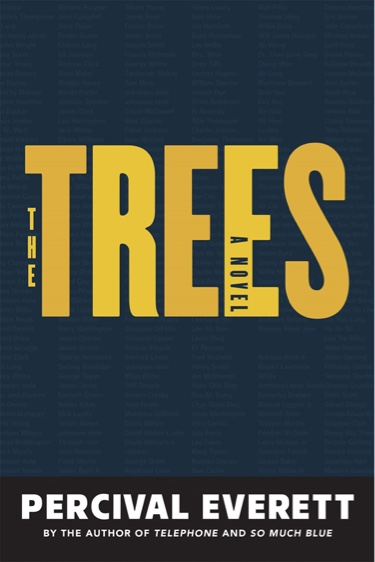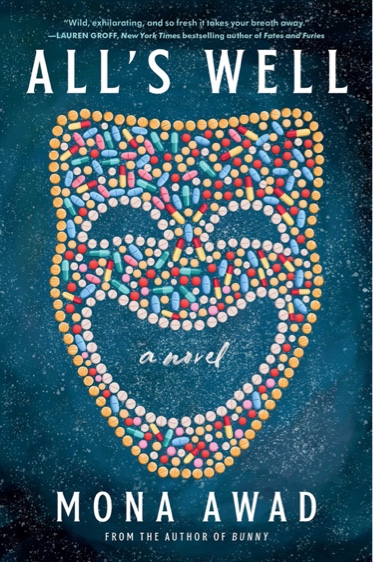-
March 14, 2022
Opening Round
-
Percival Everett
2The Trees
v.
3All’s WellMona Awad
-
Judged by
Matthew Schneier
Nightmares, tales we unwillingly tell ourselves, make fertile ground for fiction: godfather of the ghost story, the murder plot, any given dystopia. The two can pair in a vicious cycle: The books feed the terrors and the terrors feed the books.
Different as they are, All’s Well and The Trees are both nightmares—like nightmares, they deal in horror, and like all dreams, they have their own gravities, their own logics. They are not works of cold, competent realism; they operate in their own gnarled surreality. I read them over an unnervingly mild December, as a new Covid variant ran rampant through New York City, which I suspect only amplified the uneasy effect.
All’s Well, named after Shakespeare’s equivocal “problem play,” is the is-it-or-isn’t-it dream of Miranda Fitch, a theater professor at a small college whose chronic pain—following a fall from the stage during a performance of Macbeth—has cost her her acting career, her marriage, and possibly her sanity.
Pain has deformed Miranda. If her name hints at her magic—“Miranda” is a coinage of Shakespeare’s from The Tempest, the sorcerer’s daughter, from the Latin, she-who-must-be-marveled-at—her pain has made her a witch, unsexed like Lady Macbeth (if the hunky set designer she pines for were to express interest, she confesses, “I’d turn and limp away”). As bad as the pain is the inability of the (mostly male) medical establishment to treat it, and their creeping, misogynistic suspicion that it might all be in her head. Poor Miranda has mostly taken her care into her own helpless hands, dosing herself freely with pills and alcohol.
Cratering toward oblivion, she has only one real aim: She and her students will put up All’s Well That Ends Well. Miranda loves the play—her greatest role was its lead—but no one else is taken with the choice: not the students, led by the talentless Briana, who mutiny to choose Macbeth instead, or the buffoonish administrators, who’d rather not jeopardize their funding, from Briana’s rich family.
Miranda seems to be set up for another defeat when, at the local pub, she meets three odd men, a “Weird Brethren” (as Macbeth’s witches are the “weird sisters”), who seem to know her: her pain, her history, her name. They even know All’s Well. The convenient apparitions have a message for her: “[P]ain can move, Ms. Fitch. It can switch… You can pass it along, you can give it away. Piece by piece.”
Then, magically, she does. At a rehearsal, she faces off with Briana, who crumples under her grip and three local businessmen appear with a generous but anonymous donation to the theater studies program. “They say they just love college theater,” the dean reports, ludicrously, and they’re big fans of Miranda’s. What’s more, they’ve requested All’s Well That Ends Well. (“What?” balks her colleague Grace, the voice of reason.)
Surging with inexplicable health and manic with vigor, Miranda is transformed, and her transformation galvanizes and enlivens the novel, even if it becomes clear very quickly that she is hurtling toward her own Act V mad scene. Naturally, her Faustian bargain will have a cost—even if the terms of that bargain are never made clear. Here is where the dream logics of All’s Well come in: What is real, and what is imaginary, magical, or some combination thereof is never evident. It’s an exciting disorientation, until it’s not. Mona Awad writes only and always from Miranda’s perspective: We don’t know any more than she does. Her metamorphosis remains a mystery, one the ending declines to dispel. As in a problem play, it’s hard to say whether all ends well.
Bright and warm, the covers of these Memo Books are heavily debossed with graphic patterns based on flowers that are among the very first to appear each spring, and then stamped with three luscious, reflective foils. The dot-graph insides are made from a superb paper from Strathmore.
Available now in 3-Packs and as part of a year-long subscription.
That leaves the novel in a bind. It would be too pat for Awad to explain the mechanics away, but it’s exhausting to spend so long in Miranda’s company and never end up on solid ground. It’s tempting to think that the entire novel exists within her drug-addled delusion, except that secondary characters, rather than undermining her miraculous version of events, seem to confirm them. What’s worse, these characters never emerge beyond stock outlines: Grace the hardy Puritan, Hugo the bad-boy himbo. (Maybe they’re no more fully fleshed to Miranda, blinkered by debility: Here again, we’re in the Miranda trap.) Or maybe Miranda really has become a witch. Either way, her frenetic dazzling ultimately wears thin, and we’re left with her in an unresolved limbo, itchy and unsettled. As an indictment of our collective turning away from the pain of others, it’s a success—by the end, I was ready to turn away, too.
On to Money, Miss., the nightmare landscape of The Trees, a place almost too absurd to be real. The town’s name, like those of its inhabitants, suggests a romp in the land of farce—who since Dickens has had as much fun with names? In what may be the funniest novel imaginable about a forthcoming race war, Percival Everett draws the battle lines clearly: Meet Pinch Wheyface, Sheriff Chalk Pellucid, and Red Jetty—“jetty,” Everett said in an interview last October, being a synonym for “neck.” But don’t be fooled. Like many American dreams, the stranger they are, the more likely to be true. Yes, Virginia, there is a Money, Miss. If you know that already, you already know where this goes next.
If you don’t, The Trees takes its time telling. Down in Money, a mysterious murder is committed: Junior Junior Milam, a local do-nothing, is found with his skull bashed in, a rusty length of barbed wire wrapped around his neck, one eyeball gouged out “looking up at him.” (In The Trees, nothing succeeds like excess.) He’s not the only corpse on the scene. A few feet away lays another body, this one Black, also mutilated, “his neck scarred and seemingly stitched together,” not bleeding or bloody, somehow, but undoubtedly dead. In this man’s hands, the local deputies discover Junior Junior’s severed balls.
And then it happens again. And again.
Everett writes with a vicious, gory relish: The plot has a B-movie brio, and the characters are flat, I suspect by design. The Black detectives who investigate the crimes are normal, sane, good, having joined the force “[s]o Whitey wouldn’t be the only one in the room with a gun.” The white townsfolk are yokels, cretins, and idiots—even their hatefulness is pathetic. “[T]hey used to have cross burnins a lot more and family picnics and softball games and such,” whines a member of the KKK, reflecting on happier Klan days gone by. “I remember eatin’ cake next to that glowing cross.”
It’s not spoiling too much, I hope, to reveal (the book does so 78 pages in) that Money, Miss., is where 14-year-old Emmett Till was lynched in 1955. Till was murdered by Roy Bryant and J.W. Milam, after allegedly whistling at Bryant’s wife, Carolyn, a white woman; acquitted by an all-white jury, and so protected against double jeopardy, they admitted to the crime in a subsequent interview. Carolyn Bryant Donham, who is still alive, either did or did not eventually recant her allegations—an historian who interviewed her in 2017 claims she did, but when the FBI reopened the Till case in response, she denied doing so.
Doesn’t matter. Till’s murder is a grotesque stain on America’s conscience and history, like the thousands of lynchings before it (nearly 6,500 between 1865 and 1950, by one count), and for the purposes of the novel, Carolyn Bryant—appearing as herself, though initially called, for suspense’s sake, Granny C—is guilty. She tells us so: At a party with her (fictional) grandchildren, Junior Junior Milam (the first victim) and Wheat Bryant (the second), she broods about “the lie I told all them years back on that n—r boy.” (Everett’s characters make free use of the slur, unadulterated—especially the white ones.) Bryant’s lie is the novel’s original sin, but it does not begin and end with her. Her family tree—one of the trees suggested by the title, though obviously not the only one—has blood on the leaves, blood at the root. And it spreads.
As the killing spree continues, each body mysteriously accompanied by a reappearing second corpse, The Trees traces in parallel the work of a local historian, ancient Mama Z, who has been keeping records of every lynching in America since the year of her birth, 1913. (“You should know I consider police shootings to be lynchings,” she tells the detectives. “No offense.”) This archive is the moral center of the novel, the furious realism at the heart of the cartoon. Damon Thruff, a young professor and lynching expert, is astonished at the breadth of it, and painstakingly copies out its contents. As he does, the novel’s short, percussive chapters—Chapter 71 in full: “Ho to Hind: ‘What the hell is going on?’”—expand and its pace slows. For 10 pages, Everett presents a ledger of our national shame: the name of every man, woman, and child in Mama Z’s files. Some are familiar (Till, Trayvon Martin, Tamir Rice). Some are not. Many are Black, but not all: included, too, are the Chinese workers massacred in Rock Springs, Wyo., in 1885 and in Los Angeles in 1871; Leo Frank, the Jewish industrialist lynched outside Atlanta in 1915; Matthew Shepard. Some are simply “unknown.”
The first murders, the vengeance exacted on the heirs of Till’s killers, have a direct explanation; but even their perpetrators are shocked to find that they have set off a kind of chain reaction that goes far beyond them. Copycats take up the deadly spree, and the terror eventually reaches all the way to Donald Trump’s White House. There’s a nightmarishness to this zombie-horror take on American injustice, but the book’s great strength is that, as far as it leans into the realms of the absurd, it only serves to throw the deadly seriousness of the subject into stark relief. Is Money, Miss., a real place or a joke? Is America’s brutal, racist murder campaign a thing of the past or the present? In Mississippi, Sheriff Redneck tells the town brass, “There ain’t no law enforcement, there’s just rednecks like me paid by rednecks like you.” In Money, it “ain’t even the twenty-first century. It’s barely the twentieth.”
Like All’s Well, The Trees ends without breaking the spell of its terrible dream. The madding crowd has coalesced into something between a movement and a weather system—all is definitely not well. But for this reader, the choice between the two was clear. The Trees is the blackest black comedy I’ve ever read, murderous and morally urgent, and unlike the claustrophobic All’s Well, uncontainable. It barely ends at all: on the last page, Thruff is still typing as the throng continues to consume the country. The end, it suggests, is still coming, straight for us all. Can’t say we weren’t warned!
Match Commentary
By Kevin Guilfoile & John Warner
Kevin Guilfoile (he/him): I think I’ve already said that The Trees is my favorite novel from last year. I could probably talk about it every day of the ToB, and I hope it keeps winning just so I get to expand on half the things about it that fascinate me. But I’ll start with this: Everett had to have written this novel two years ago or more, but it reads like a direct response to events of the last six months.
Conservatives all across the country are writing laws that would ban discussions of anything that would make white people “uncomfortable,” a real-life situation that is nearly as absurd as anything in this book. The chilling effect of these laws will make it difficult for students in some parts of this country to learn anything at all about the history of racism in America, which of course means they can’t learn the history of America.
Everett seems to be saying in reply, You don’t like being made uncomfortable? We are going to have this conversation in the most uncomfortable way imaginable. It’s amazing from beginning to end, and I don’t think I have ever read a novel that was so perfectly in a dialogue with fast-moving current events. I’ve thought about it every day since I read it.
John Warner (he/him): Given the scope and range of his work, it is difficult to say what makes a “Percival Everett novel,” but I think what you note about the timeliness/prescience of The Trees is true of a number of books, particularly his overtly comic ones like Erasure and I Am Not Sidney Poitier.
I’m not sure I believe everything I’m about to say, but consider it a working framework that we can all kick around to see if it holds up.
There are some writers who I think are oriented toward casting an eye backwards with the goal of illuminating that past in a way that allows us to know that world more deeply. Jonathan Franzen’s Crossroads wasn’t chosen for the Tournament, but I thought he accomplished this quite well, particularly for Marion Hildebrandt (the mother in the novel).
Other novelists inhabit the moment we’re living through in a way that captures what it’s like to live in the world, but which does not necessarily offer a higher level commentary about that world. It is of the world, but does not have a larger self-awareness, if that makes sense.
Some books can achieve the insights as though we’re analyzing the past, only they’re about the present. Percival Everett writes those books. The Trees is a novel that captures the experience of living through today while also offering a satirical take on what it’s like to live through today.
Some of this is found in the form. As a genre, a satire is a commentary on that which it is satirizing, and Everett is a great satirist. But also he just appears to be able to hear and then amplify frequencies that others are not as attuned to, or perhaps don’t want to be attuned to.
Kevin: It is striking how confrontational The Trees is. I’m trying to think of another novel, particularly a comic novel, that also has the same urgency and I’m coming up with nothing.
John: The murder of George Floyd was the final cranking up of the volume to where everyone was forced to acknowledge that they heard what’s going on. The anti-woke, anti-CRT moral panic is people very invested in the status quo frantically trying to stop progress. But as Judge Schneier remarks about the conclusion of The Trees, there’s no stopping it now.
Kevin: I enjoyed All’s Well more than Judge Schneier. I tend to like novels that are about other kinds of storytelling—novels about plays, about movies, about musicians. I enjoyed the college-drama subculture in All’s Well, and the way Awad adapted Shakespearean themes and plot into her story. Novelists naturally tend to write novels about other novelists, but I enjoy the crossover effects of these kinds of “dancing about architecture” narratives. It’s like when Munch from Homicide used to show up on Law & Order. Always a treat.
John: All’s Well is one of the Tournament books that I wasn’t able to read in time for our commentary, but not because I didn’t want to. I was a victim of the problems in the publishing supply chain and my New Year’s resolution to not buy any books (including ebooks) from Amazon. I put in an order at my local independent bookseller and then we waited, and waited, and waited for the book to be available, and it didn’t happen in time.
Yes, I could’ve gone to a different ebook provider or the library, but given that there’s always more books in the Tournament that I could read and did have available, All’s Well lost out.
Anyone else experiencing these kinds of disruptions?
New 2022 Tournament of Books merch is now available at the TMN Store. As a reminder, Sustaining Members receive 50 percent off everything in our store. To find out why we’re asking for your support and how you can become a Sustaining Member, please visit our Membership page. Thank you.
Welcome to the Commentariat
Population: You
To keep our comments section as inclusive as possible for the book-loving public, please follow the guidelines below. We reserve the right to delete inappropriate or abusive comments, such as ad hominem attacks. We ban users who repeatedly post inappropriate comments.
- Criticize ideas, not people. Divisiveness can be a result of debates over things we truly care about; err on the side of being generous. Let’s talk and debate and gnash our book-chewing teeth with love and respect for the Rooster community, judges, authors, commentators, and commenters alike.
- If you’re uninterested in a line of discussion from an individual user, you can privately block them within Disqus to hide their comments (though they’ll still see your posts).
- While it’s not required, you can use the Disqus <spoiler> tag to hide book details that may spoil the reading experience for others, e.g., “<spoiler>Dumbledore dies.<spoiler>”
- We all feel passionately about fiction, but “you’re an idiot if you loved/hated this book that I hated/loved” isn't an argument—it’s just rude. Take a breath.



